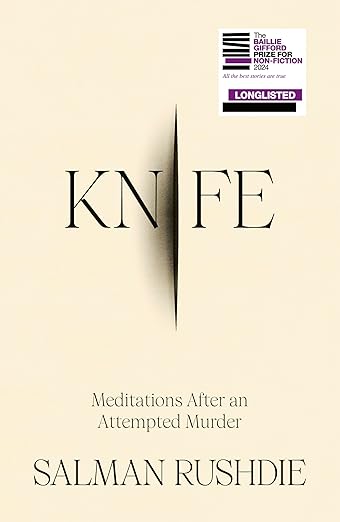Knife: Meditations after an attempted murder by Salman Rushdie (2024)
Memoir
10/23/20244 min read
I bought this book in June when I was staying with my aunt visiting Sidney on Vancouver Island, but delayed reading it for a time. I thought this was excellent. I am currently reading 'Midnight's Children' and am enjoying it while not being so emotionally invested in the characters. Salman Rushdie's fictional prose style dazzles, but is not always so readily accessible even after doing some preliminary research about the setting (namely India and Pakistan before and after independence in 1947). I have though always liked his non-fiction, both the erudite literary essays and, particularly, the third-person autobiography called 'Joseph Anton: A Memoir' (2012) which contained this gem when he was writing about living in London under the Ayatollah's fatwa:
The police had suggested a wig. Their best wig man had been to see him and taken a sample of his hair. He was extremely dubious, but had been reassured by several of the Prot officers that wigs really worked. 'You'll be able to walk down the street without attracting attention', they said, 'trust us'. He received unexpected confirmation of this from Michael Hur. 'In the matter of disguise you don't have to change much, Salman', Michael said speaking slowly and blinking rapidly, 'just the key signs'.
The wig was made and arrived in a brown cardboard box looking like a small sleeping animal. When he put it on his head he felt outlandishly stupid. The police said it looked great. 'Okay', he said dubiously, 'let's take it for a walk'. They drove him to Sloane Street and parked near to Harvey Nicholls. When he got out of the car, every head turned to stare at him. And several people burst into wide grins or even laugher. 'Look', he heard a man's voice shout,' there's that bastard Rushdie in a wig'. He got back into the Jaguar and never wore the wig again.
Ten years after the publication of this Joseph Anton book, Salman Rushdie was stabbed numerous times by an Islamist fanatic when he started speaking at an event at the Chautauqua Institution in upstate New York. He sustained injuries to his body, hand and, particularly nastily, his left eye in which he is now blind.
This book tells the story of his recovery, but being by Salman Rushdie, it is so very much more. He writes about his marriage to Eliza (wife number five!) with huge tenderness and humility, about his relationship with his two sons, his friendship with other leading writers and sets out his views on religious belief generally (stridently atheistical). There are sideswipes at his political and literary bête noirs, especially those who failed to defend him when he was required to live in hiding. There is also a marvellously compelling section towards the end in which he imagines conversations that he might have with his would-be assassin. He digresses beautifully into all manner of literary observations, riffs on the notion of 'gumption' and expresses the view that we should regard enjoying a state of happiness as a privilege rather than a right. This is quite a short book, but it is packed with interest and humanity.
For me personally one passage that stood out was the description of how his son Milan, who does not like to fly, came over from the UK to visit him in the wake of the knife attack on the Queen Mary 2. It is clear from the dates that this transatlantic crossing was the same one I was on in late August 2022. We had amazing weather all the way over.
During the period the book covers, Salman lost his good friends Martin Amis and Paul Auster. He reflects that he could also very easily now be dead. But thanks to the skill of his doctors and the support of friends and family, he did not die. He has a second chance a living and explains how it will be different for him this time. He has permanent and dreadful injuries, but as he amply demonstrates here, his capacity to write brilliantly is wholly undiminished. Great writers of fiction, in my experience, are often actually at their very best when writing non-fiction.
Salman Rushdie is the most wonderful advocate for free speech, and his right to say what he thinks must of course be defended to the death. But he can be deeply infuriating in some of his views. One passage - literally - just about had me falling off my chair:
To regret what your life has been is the true folly, I told myself, because the person doing the regretting has been shaped by the life he subsequently regrets. There were probably exceptions to this principle, but very few of the people who ought to regret their lives - Donald Trump, Boris Johnson, Adolf Eichmann, Harvey Weinstein - ever do so.
Rarely can the sheer offensiveness of the views held wholly sincerely by our artistic elite class have been more evidently on display. Let us tar all with whom we disagree with the same brush of moral depravity irrespective of their actual moral depravity. Repulsive.
When voiced by lesser beings such sentiments are hard to forgive, but Sir Salman Rushdie can be forgiven. He is a living legend, and while he is a now US citizen who apparently considers 'Brexit Britain' to be a miserable little place, also very much our national treasure too. I hope he lives long enough to write at least several more volumes of autobiography.
Two final questions:
i) Why has no one yet written a really first-rate, full scholarly biography of Rushdie?
and
ii) Why has this courageous and brilliant man not yet won the Nobel Prize for literature?

